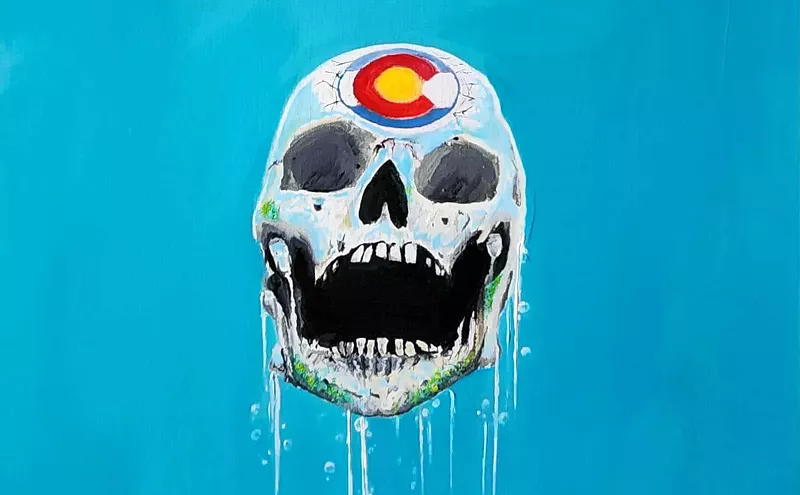It's his own fault. Coupland, the author of Generation X and subsequently credited with coining the term now Super-Glued to the public consciousness, eternally carries that monkey on his thirty-something back. He now refuses to refer to it as anything other than "the G word." Perhaps it's not easy being that notorious coiner of phrases.
"Maybe I'm maturing," Coupland muses (he's the kind of guy who always muses). "Anyway, I'm working at it. My interior monologue is always working toward transcendence in some form or another--doing what I do just focuses it. Even when I was still in art school, the impulse was always there--I just found the most effective channel in writing. Now I can't imagine doing anything else."
Coupland's new novel, Girlfriend in a Coma, seems to be meandering away from familiar ground. The story of a woman who spends nearly twenty years in a coma while her friends wander like zombies through active life, it's more pointedly about growing up--or at least about trying to grow up, eclipsing the tortured irony so concretely associated with Coupland's Gen-X milieu. Is the author ready to throw off his most readily distinguishing feature? Well, maybe he'll just trade it for a higher level of understanding.
"Irony is fun," Coupland says. "It certainly involves the analytical side of the brain, and it's anesthetic, something that prevents you from feeling. But you're never going to get to heaven by quoting Mary Tyler Moore reruns.
"It's what I know. I'm good at it. Most people of a certain age are also pretty darn good at irony, too--I doubt there's ever been a more ironic crew of people than those born after 1955. Most things we take for granted as communication modes are, like, Martian to anyone else born before that."
He doesn't think creeping maturity is the problem. "I've always thought of myself as a grownup," he insists. "I never thought, 'Oh, when am I going to be grown up?' I've been grown up in my head since I was twelve." But maybe there's something else in the cards for the forward-looking postmodern social critic. "Getting rid of it is hard," he says. "Probably, having done what I've already done with irony, I'll go back and look at it with a different lens."
Still, Coupland remains attached to irony. "I never get tired of it," he says, as if to reassure an unseen legion of post-'55 peers who might be listening.
He excuses himself momentarily to haggle over the room temperature with a hotel maintenance man. Apparently, climate control at the Intercontinental is more complicated than you'd think. Oh, well. Coupland contains his petulance long enough to munch on the grilled cheese. The clock is ticking.
The idea of waking from a long-term coma and what it entails, he says, has been spinning around in his mind for a long time. To be exact, it was spawned in 1975 when coma queen Karen Ann Quinlan was all the rage with the media. "My memory is that for about two years, in every newspaper and in every magazine, there was that picture," he says. "She was like a hologram--if you looked at it closely enough, you'd almost be able to see the other side. The only picture of her we had as a culture was like the gateway picture."
It's probably no coincidence that Coupland's coma girl, a fresh-faced teen with straight brown hair parted in the middle, is named Karen, too. Unlike Quinlan, however, this Karen does come back: She goes to sleep in 1979, and when she awakens in 1997, she's surrounded by the same crowd and meets her seventeen-year-old daughter for the first time. In some ways, though, Karen emerges more changed than anyone else in the book.
"I still see people I went to kindergarten with, even people who go away and come back twenty years later," says Coupland. "They might look different, their life might be somewhat exotic, but when you talk to them, their essence is identical. Do people change? Very little, unless they've had some radical experience in life."
Girlfriend in a Coma flirts with that kind of experience. But Coupland hasn't quite figured out whether or not Generation X is going to find a way to age gracefully.
"In this century, we developed the arrogant habit of thinking we know what the future will be like," he says. "Only recently, a lot of belief systems like modernism, Marxism and communism all played themselves out, and now we realize, oh, yeah--we don't know what the future will be, after all. The future is a great, big, exciting question mark again. The future is new."
Coupland interrupts himself. "Oh, boy," he says, "I'm starting to sound like a real Pollyanna, aren't I?" And then, the new, improved Douglas Coupland corrects himself. "You have to know the past, because we don't want the future to look like the past. And that's what it all means."
--Froyd
Douglas Coupland reads from Girlfriend in a Coma, 7:30 p.m. Thursday, March 26, Tattered Cover LoDo, 1628 16th Street, 436-1070.












